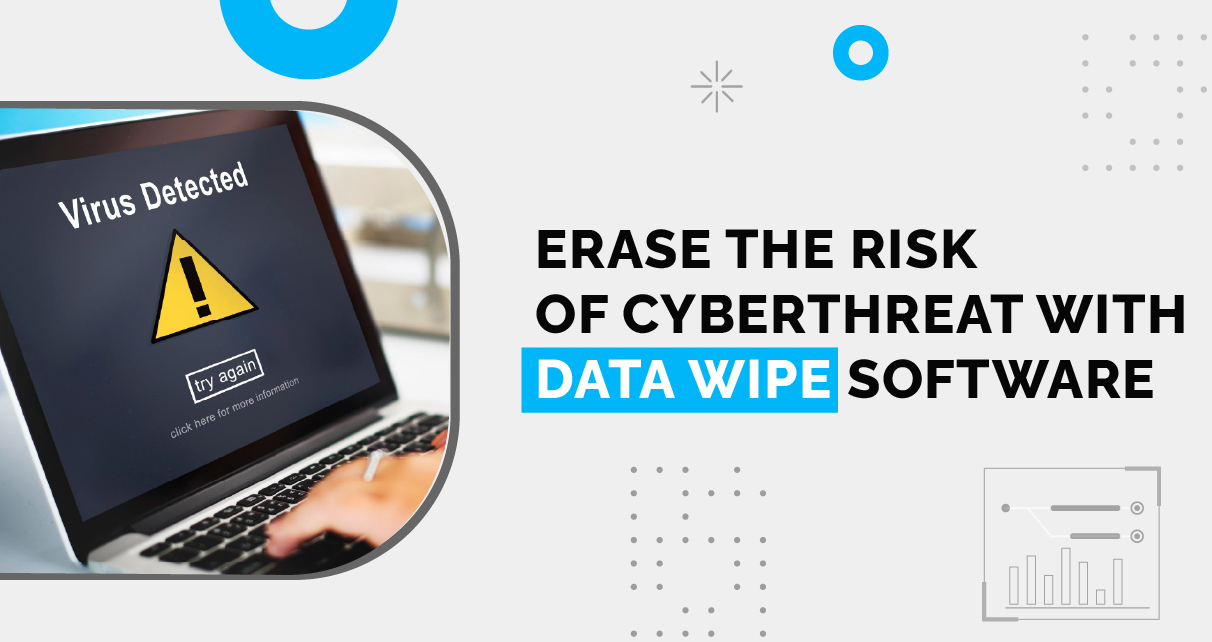
The Importance of Data Wiping for Cybersecurity in 2024
Cybersecurity has become a significant concern for organizations in an increasingly digital world. The shift to remote work sparked by the COVID-19 pandemic has left many businesses vulnerable to cyber threats, as sensitive information is often scattered across devices at home and in the workplace. To protect this information, organizations must protect data in active use and at rest.
Data breaches, mainly due to improper removal of IT assets and non-usage of antivirus software, have emerged as a significant issue, resulting in numerous data theft cases. Reports of customer information being compromised during equipment removal have become very common, emphasizing the need for robust data die practices.
As per recent statistics, there have been significant breaches in India regarding removing unsuitable IT assets. Many organizations face potential financial loss and reputational damage due to the emergence of sensitive issues from old devices that were not adequately maintained before disposal.
IBM reports the average cost of data computed on India reached a whopping ₹19.5 crore (about $235 million) in FY24, driven mainly by inappropriate data breaches.
Risks of Improper IT Asset Disposal
Disposing of IT assets incorrectly can lead to significant consequences.
- Economic loss and reputational damage: Companies are responsible for the security of the data they manage, and data breaches can result in significant fines and loss of consumer confidence under the recently enacted Digital Personal Data Protection Act, 2023, which prescribes a penalty of up to ₹250 crore for organizations -Cannot apply procedures.
- Legal implications: Failure to comply with disposal regulations such as e-waste (management) regulations can result in significant fines and legal consequences.
- Environmental risks: Improper e-waste disposal contributes to pollution and poses public health risks.
Key Points on Data Breaches from Improper IT Asset Disposal in India
- Increased population: India is experiencing repeated data breaches resulting from substandard IT asset disposal practices, with incidents involving customer data from old servers and abandoned hard drives there is included
- Impact on individuals: When personal information, such as name, address, and financial information, is leaked, individuals are vulnerable to identity theft and fraud
- Legal implications: The Digital Personal Data Protection Act emphasizes the need for robust data protection measures, including appropriate disposal actions and substantial penalties for non-compliance.
- Lack of awareness: Many companies don’t fully understand the risks associated with disposing of improper IT assets, resulting in poor data cleanup when disposing of old equipment.
Notable Examples of Data Breaches
- State Bank of India (SBI): In 2019, SBI faced a data breach in which customer information was exposed from an unsecured server.
- Justdial: A massive data breach that exposed the personal information of millions of users, including phone numbers and addresses.
- BigBasket: A breach occurred on the grocery platform where user information such as email addresses and passwords were compromised.
- Aadhaar data leak (October 2023): Moreover, security reports that the personal details of 815 million Indians were leaked on the dark web.
How to Mitigate Risks
- Data Sanitization: Use robust data wiping techniques to permanently purge sensitive information from old devices before removing them.
- Professional ITAD Services: Use accredited IT Asset Disposal (ITAD) providers that use safe data disposal practices.
- Compliance: Ensure compliance with data privacy laws and applicable data removal policies.
- Employee Training: Educate employees on proper data handling and disposal.
The Role of Data Wipe Software
Using Data Wipe Software is an essential step in protecting sensitive information. Solutions like Unistal Data Wipe Software offer many benefits:
- Comprehensive data erasure: Unistal ensures complete data destruction, making retrieving sensitive information from disposable devices virtually impossible.
- Compliance assurance: The software helps organizations comply with data protection laws by providing comprehensive data cleansing reports and demonstrating due diligence in data wiping practices.
- Easy-to-use interface: With its intuitive design, Unistal enables organizations to manage their data erasure processes with minimal technical expertise efficiently
- Environmental responsibility: By safely erasing data, organizations help manage e-waste responsibly, reducing environmental impact.
Conclusion
As data breaches become more common, the need for effective data-wiping practices cannot be overstated. By prioritizing the effective removal of IT assets and implementing advanced Data Eraser Software such as Unistal, organizations can protect sensitive information, reduce risk, and build a reputation for trust and reliability in the eyes of their customers. By 2024, investment in data-erase technology will increase cybersecurity and pave the way for a more secure digital future.




